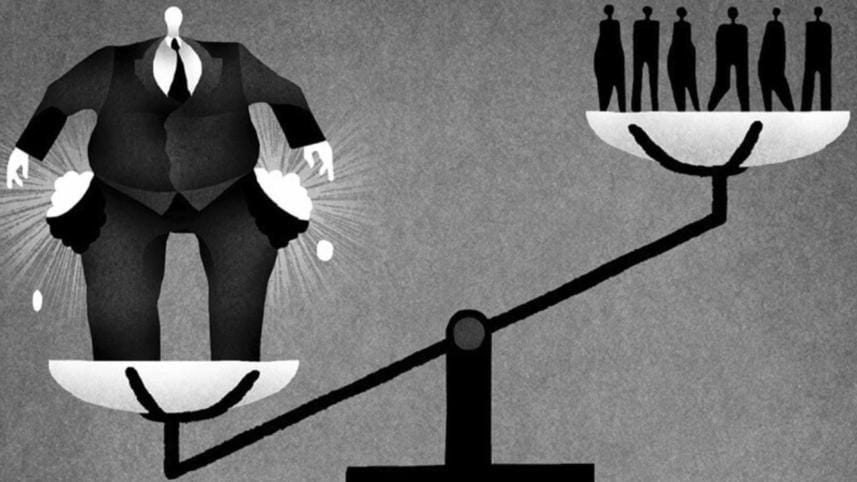Can we beat dysfunctional capitalism?

Whom should I blame when I see the rich and influential speed their expensive cars down the street, as if everything's perfectly fine, while my father, who has been working as an unpaid journalist for the past several months, struggles every day? Dysfunctional capitalism and unrepresentative democracy.
It's clear that capitalism has seen enormous progress over the last few decades. Although it has seen its fair share of positives, it also has major drawbacks. According to the Edelman Trust Barometer, in 2020, 56 percent of people globally believed capitalism is doing more harm than good while a record 83 percent of employees stated that they were fearful of losing their jobs. Capitalism has left numerous people behind, and political institutions have ignored them too. Distrust is fuelled by an increasing sense of systematic inequality and discrimination. The perception is that institutions and the global economy are serving the interests of the few over those of the majority.
Democracy remains an important political ideology designed to protect individual freedom, speech and choice. But the problem lies with the current "delivery system," which is still organised around age-old democratic elements. When political power is captured by the wealthy, the masses begin to distrust the government. Around the globe, voter engagement has declined over the past decade. There is a growing "representative gap" in politics, with major parties becoming organised around heavily ideology-based policies and biased cultural debates. And while politicians continue to play this sort of identity politics globally, the age-old construct of democracy—one of the founding principles through which modern society was created—becomes "poisoned." While democracy fails to keep checks and balances, people's belief in the systems slowly diminishes, causing the rise of intense nationalism and, ultimately, making way for authoritarian-styled governance in power as people start to believe that is the only solution to real-world problems.
As public participation wanes, the democratic arena is further dominated by external groups with outlandish views, leading to the capture of more democratic processes. Funded by the wealthy minority, the ideas of a few try to engulf the many through their mandates. Politicians play a tug of war with the state itself, not caring about its economy, resources and most importantly, the people. Threatening free press, politicians resorting to the culture of lying with incentivised radical supporters pose a hazard to the face of democracy and capitalism. Research says that nearly half the population worldwide view government and media as divisive forces in society, completely contradictory to the noble cause for which these concepts originated and spread throughout modern humanity. Through disinformation and division, these two institutions continue to feed the cycle and exploit it for commercial and political gains.
Politicians say they spend billions behind infrastructure, security and development projects while they transfer millions of people's taxes to their own pockets. And while the economy plunges with high inequality, we continue the push for weapons and violence. In certain circumstances, blaming everything on other countries, ethnicities and minorities is a petty way of knowingly fuelling conflict. Personally, it feels awful and extremely unhuman to see our species—soon to become inter-planetary—resort to such means for so-called happiness, growth and development, taking lives and destroying what humanity stands for.
Linking peace and security to sustainable and inclusive development is the way to go at this point. Levelling the playing field, empowering the youth, balancing competence with ethical behaviour can go a long way by spreading capital, creating start-ups and jobs. Business itself has to do enough to address societal problems. More importantly, business leadership must be handed to the people. It's high time we started to encourage an innovative and flexible outlook on policy-making instead of a strict, confining and even violent one. Showing the people that the system works, and giving them credible and honest information, is absolutely critical to breaking this system of distrust. Solutions over divisiveness, honesty and partnership can take us far in terms of building trust. It is not about the voices of the many over the few, because the few are not just wealthy elites running society or a tiny ethnicity fighting hard to keep their language alive, it is about everyone's inclusion in modern-day society. Otherwise, who knows what circumstances the tens of billions of human and other lives will have to go through a hundred years later.
Even though the middle-class is being thumbed down while the wealthy are getting wealthier each day, I wish to believe this planet can still become a better home for its inhabitants. Inequality, crony capitalism and flaws in governing systems will always persist, but without the will to be better, how can we ever change?
Eahsan Abedin is a student.



 For all latest news, follow The Daily Star's Google News channel.
For all latest news, follow The Daily Star's Google News channel.
Comments